AI-generated content is everywhere. Businesses, bloggers, and even major news outlets are leveraging artificial intelligence to create content at scale. But there’s one big question on everyone’s mind: Is AI content hurting SEO?
One of my former clients, a business owner, abruptly ended our contract after learning I was using AI in my content creation process. They were convinced that AI-generated content would lead to Google penalties, tanking their rankings and harming their online presence. Despite my efforts to explain the reality—AI is a tool, not a shortcut, and Google penalizes low-quality content, not AI itself—they stuck to the misconception.
What they didn’t realize is that AI, when used correctly, enhances SEO efforts rather than destroying them. The problem isn’t AI—it’s how you use it. In this article, I’ll break down 11 key truths about AI content and SEO without the fearmongering. Whether you’re just starting out or already using AI to create content, you’ll walk away with clear, actionable insights. Let’s get started!
What Does Google Think About AI-Generated Blog Articles?
Google has clarified its stance on AI-generated content multiple times. The search engine giant does not outright penalize AI-written content. Instead, it focuses on content quality, relevance, and value rather than how it was created.
In Google’s own words, helpful, people-first content is the key to ranking well, whether it’s written by a human or generated by AI. Google is more concerned with whether the content is useful, informative, and aligns with user intent rather than whether a person or an algorithm produced it.
If AI content is spammy, lacks depth, or exists purely to manipulate rankings, Google will flag and penalize it. But if AI is used responsibly—to enhance content creation, speed up research, and improve user experience—it can be a powerful tool for SEO success.
Truth #1. Google Doesn’t Hate AI Content—It Hates Low-Quality Content
One of the biggest myths floating around is that Google has a vendetta against AI-generated content. The reality? Google doesn’t care whether content is written by a human or a machine—it cares about the quality and usefulness of that content.
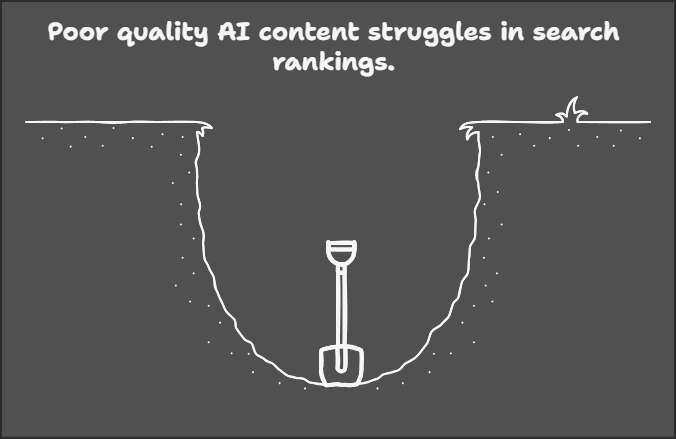
Google’s algorithms are designed to prioritize content that is helpful, engaging, and informative. If an AI-generated article answers user queries effectively, provides value, and is structured well, it can rank just as well as human-written content. However, AI-generated content that is poorly written, stuffed with keywords, or lacks originality will struggle to perform. It’s not about AI; it’s about quality.
Checklist for a High-Quality Blog Article
Creating a high-ranking blog post requires more than just words on a page. Use this checklist to ensure your AI-assisted or human-written content meets SEO and user expectations:
- Relevance: Does the content directly address the target audience’s search intent?
- Clarity & Readability: Is the text easy to understand, well-structured, and free from jargon?
- Originality: Does the content offer unique insights, fresh perspectives, or expert commentary?
- Keyword Optimization: Are primary and secondary keywords naturally integrated without stuffing?
- Internal & External Links: Have you included relevant internal links and authoritative external sources?
- EEAT Compliance: Does the content demonstrate experience, expertise, authority, and trustworthiness?
- Engagement: Are there compelling headlines, bullet points, images, and calls to action to keep readers engaged?
- Technical SEO: Is the article properly formatted with headings, meta descriptions, and alt text for images?
- Fact-Checking: Have all claims, statistics, and references been verified for accuracy?
Following this checklist will help ensure your content not only ranks well but also provides real value to your audience.
Truth #2. AI Content Needs a Human Touch
AI is a fantastic tool, but it’s not perfect. Even the most advanced AI models sometimes produce generic, repetitive, or even incorrect information. That’s why human intervention is critical.
Yes, I use AI, but I don’t just copy and paste what it generates. Instead, I feed it with structured ideas, guiding it to make my writing more clear and understandable. AI doesn’t replace my expertise—it amplifies it. I refine its output, add insights, and ensure the final piece is accurate, engaging, and aligned with the brand’s voice.
Everyone can use AI, but 1+1 is not always equal to 2 in AI. It requires human oversight to catch errors, shape narratives, and add emotional depth—elements that truly connect with an audience. Google values authenticity and expertise, so blending AI efficiency with human creativity results in the best-performing content.
Truth #3. AI Content Alone Won’t Rank—It Needs Strategy
Many businesses make the mistake of thinking AI-generated content alone will bring them to the top of search engine results. The truth is, SEO success depends on strategy.
To rank well, content must be structured properly with clear headings, well-placed keywords, internal links, and a logical flow. Additionally, Google favors content that matches user intent—meaning you need to ensure your content directly answers user queries. AI can assist with writing, but without an SEO strategy, it won’t get far.
Truth #4. AI Can Help You Produce More, But Not Necessarily Better
AI tools make content creation faster, but that doesn’t automatically mean better content. Many businesses fall into the trap of prioritizing quantity over quality, churning out dozens of AI-written articles without proper refinement.
More content can help boost rankings, but only if it’s high-quality, well-researched, and engaging. That’s why AI needs a skillful master to steer it in the right direction, refining its output, ensuring clarity, and adding a human touch that AI alone cannot replicate. Instead of relying solely on AI to generate content, businesses should use it as a tool to enhance their content strategy, not replace human creativity and expertise.
Truth #5. AI Content Must Be Optimized for EEAT
Google places a strong emphasis on EEAT—Experience, Expertise, Authoritativeness, and Trustworthiness. If your AI-generated content doesn’t demonstrate these qualities, it won’t perform well in search rankings.
To ensure AI content aligns with EEAT, businesses should:
- Include author bylines with real expertise.
- Link to credible sources to back up claims.
- Add real-life case studies or examples to enhance authority.
- Ensure all information is accurate and up to date.
Truth #6. AI-Generated Content Can Still Be Penalized
While AI content itself isn’t against Google’s guidelines, using it unethically can lead to penalties. Google actively combats spammy, misleading, or duplicate content, and AI-generated content that falls into these categories can get deindexed.
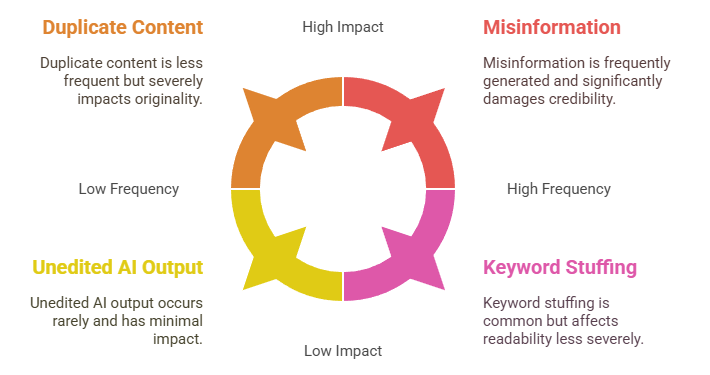
Avoid penalties by ensuring AI-generated content is original, valuable, and user-focused. If AI is being used to mass-produce low-quality content purely for ranking purposes, it will backfire.
What Kind of AI Content Gets Penalized?
To avoid Google penalties, it’s important to know what types of AI-generated content can trigger algorithmic actions:
- Duplicate Content – AI tools sometimes regurgitate existing content, leading to plagiarism issues.
- Keyword-Stuffed Content – Overloading AI-generated text with keywords in an unnatural way can be flagged as spam.
- Low-Quality or Thin Content – AI-generated content lacking depth, originality, or real value for readers is considered low quality.
- Misinformation or Inaccurate Data – AI models can generate incorrect facts, which can harm credibility and rankings.
- Unedited AI Output – Directly publishing AI-written content without human review can lead to awkward phrasing, irrelevance, or factual errors.
By avoiding these pitfalls, AI-generated content can remain an asset rather than a liability for SEO.
Truth #7. AI Can Speed Up SEO Tasks Beyond Writing
AI isn’t just for content creation—it can streamline a variety of SEO tasks. Many SEO professionals now use AI for:
- Keyword research – AI tools can analyze search trends and suggest high-ranking keywords.
- Content clustering – AI helps organize topics into pillar pages and subtopics.
- Technical SEO analysis – AI can scan websites for SEO issues, such as broken links or slow loading speeds.
- Internal linking – AI can suggest relevant pages to link to for better site structure.
By leveraging AI beyond just content writing, businesses can save time and improve their SEO efforts.
Truth #8. Human-Written Content Still Has the Edge in Some Areas
While AI is great for generating structured content, there are areas where human-written content still outperforms. Topics requiring personal stories, expert opinions, deep analysis, or emotional appeal are better suited for human writers.
AI-generated content often lacks the creativity, personality, and authenticity that make certain articles truly engaging. It struggles with storytelling, humor, and the nuanced tone needed to create strong emotional connections. Readers appreciate content that feels genuine and relatable, and while AI can assist in drafting, the final human touch is what makes content truly stand out.
Additionally, AI lacks lived experience—it can’t recall personal anecdotes, provide unique insights, or write with passion the way a human can. For brands aiming to build trust, content that reflects human expertise, storytelling, and industry knowledge will always have a competitive edge over AI-generated text. The key to success is combining AI’s efficiency with the emotional intelligence of human writers, ensuring content remains compelling and impactful.
Truth #9. AI Can Improve Readability and Engagement
AI can help simplify complex topics, making them more digestible for a wider audience. It can break down industry jargon, suggest engaging headlines, and improve sentence structure for better readability.
Since readability and engagement impact dwell time and bounce rates, using AI to enhance clarity and structure can contribute to better SEO performance.
Truth #10. AI Content Should Be Fact-Checked
AI is prone to “hallucinations,” meaning it sometimes generates incorrect or misleading information. This is why fact-checking is non-negotiable when using AI content.
I remember how many times AI failed me. It has randomly blurted out facts that were completely unrelated to my prompt—so off-topic that reading them made me question whether the AI even understood the request. When this happens, it’s tempting to regenerate the response again and again, hoping for better results, only to find yourself drifting further from what you actually need. This cycle can be frustrating, especially when working with important or technical information.
AI models pull from vast amounts of existing data, but they don’t always distinguish between reliable sources and misinformation. Sometimes, they even fabricate facts, statistics, or quotes, presenting them as real. If this content is published without review, it can damage a brand’s credibility and authority.
To avoid this, businesses should verify all claims, statistics, and references before publishing AI-generated content.
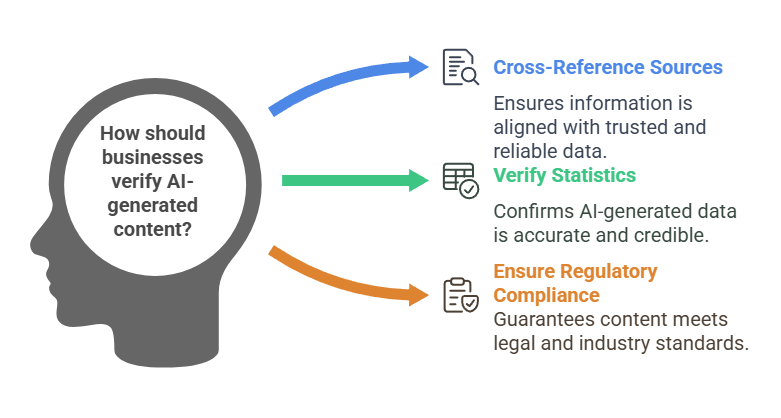
By taking the time to fact-check AI content, businesses can protect their reputation, maintain audience trust, and ensure that their content is both accurate and valuable.
Truth #11. AI and SEO Are Evolving—Stay Updated
Google continuously updates its algorithms, meaning AI-driven content strategies must adapt to maintain rankings and search visibility.
SEO is not a one-time effort—it’s an ongoing process that requires continuous adaptation. Just as AI tools are improving, so are Google’s methods for detecting high-quality content. What works today may not work six months from now, making it essential for content creators and businesses to stay updated on the latest SEO trends and AI advancements.
One of the biggest shifts in AI and SEO is the increasing focus on search intent and user experience. Google now prioritizes content that genuinely helps users, rather than just being optimized for keywords. This means AI-generated content must be aligned with real audience needs, structured for easy readability, and formatted in a way that encourages engagement.
Additionally, Google’s algorithm updates have started incorporating more AI-powered ranking factors, such as Google’s Helpful Content Update. This update specifically rewards content that demonstrates expertise, trustworthiness, and genuine value to users—further reinforcing the need to balance AI efficiency with human oversight.
To stay ahead, businesses and content creators should:
- Monitor Google’s updates regularly and adjust their content strategy accordingly.
- Test and analyze AI-generated content performance to see what works and what needs improvement.
- Follow industry experts and trusted SEO sources to gain insights on upcoming changes.
- Continuously refine AI-assisted content to ensure it meets both current SEO standards and future search trends.
By staying proactive and adaptable, businesses can leverage AI content effectively while maintaining strong search rankings in an ever-changing digital landscape.
Frequently Asked Questions
Can Google detect AI-generated content?
Yes, Google can identify AI-generated content, but it does not automatically penalize it. The focus is on content quality rather than the method of creation.
Is AI-generated content suitable for all industries?
Not always. AI can be helpful in many industries, but in highly regulated fields like medicine, finance, and law, AI-generated content should be carefully fact-checked and supplemented with expert insights.
How do I avoid AI-generated content sounding robotic?
Use AI as a drafting tool rather than a final writer. Adding a human touch by refining the text, improving flow, and injecting personality ensures the content is engaging and natural.
Can AI help with voice search optimization?
Yes! AI can analyze voice search trends and optimize content for conversational queries, making it more effective for spoken search results on platforms like Google Assistant and Siri.
How Can Jelly Ann Help You?
Struggling with SEO and AI-generated content? I can help you create high-quality, SEO-optimized content that ranks well and drives traffic to your website. Whether you need content audits, AI refinement, or a full SEO strategy, I’ll ensure your site meets Google’s standards and attracts the right audience.
With years of experience in SEO and content creation, I know what works. Don’t let AI misconceptions hold you back—let’s build a strategy that maximizes your website’s potential. Contact me today for a free consultation, and let’s turn AI into your biggest asset!I don’t just use AI—I master it, ensuring it serves a purpose and enhances your brand’s online presence. If you want content that actually performs, let’s work together.
📩 Book a free consultation today, and let’s turn AI into your website’s biggest asset!


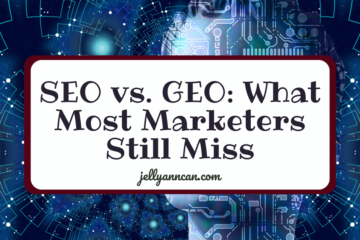

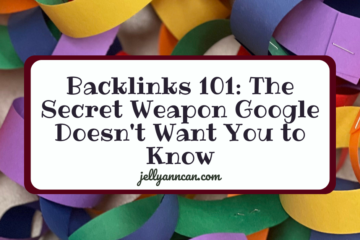


0 Comments